'Searching for something deeper'After residing in the US for 20 years, physician Wu Shuh-min (吳樹民) felt a strong calling to return to his native Taiwan.
"I wanted to come home and do something for my country," Wu recalled. "It was like I was encountering a mid-life crisis, and trying to search for something deeper."
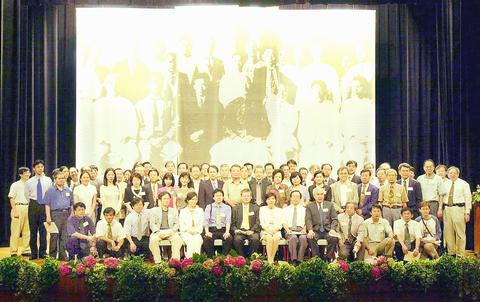
PHOTO: CHIANG YING-YING, TAIPEI TIMESN
In 1989, Wu returned to Taiwan, leaving his children and his well-established career behind. His mission at the time was to take care of the financially troubled Independence Evening Post (自立晚報) -- a newspaper founded by his father Wu San-lien (吳三連) and known for its vehement support of Taiwan's democracy movement.
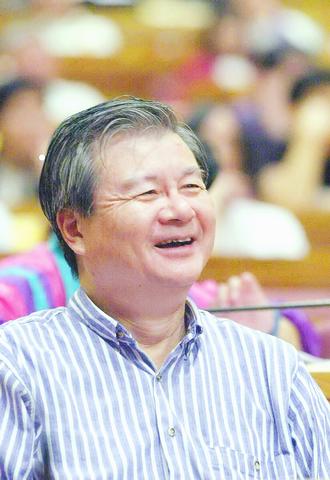
PHOTO: CHIANG YING-YING, TAIPEI TIMES
But the seeds of Wu's desire to do something for Taiwan were planted long before his decision to return to his homeland.
"The idea of campaigning for an independent Taiwan emerged soon after I went to study in the US," Wu said, now a national policy advisor and executive director of the Foundation of the Medical Professionals Alliance in Taiwan. "Any conscientious intellectual witnessing Taiwan's low international profile would have had the same thought."
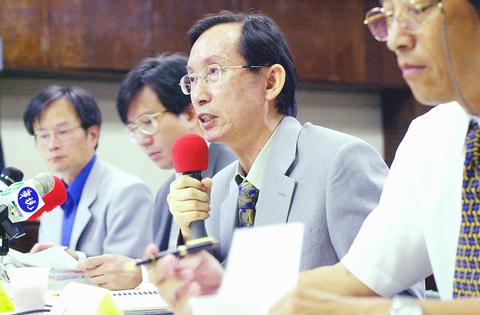
PHOTO: CHEN CHENG-CHANG, TAIPEI TIMES
When not teaching or practicing medicine, Wu devoted all his spare time in the US to aiding Taiwan's democracy movement and helping it out of its international predicament.
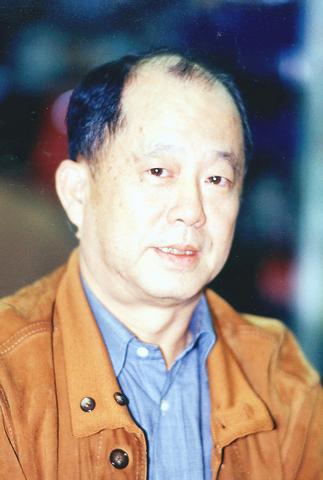
PHOTO COURTESY CHUNG KUN-CHING
"In retrospect, Taiwan's [road to] democracy has been a chapter of history filled with blood and tears. The fruits of democracy, though still fledgling, were not easily attained. It took the collaborative endeavors of many courageous Taiwanese -- both in the country and overseas -- who insisted on fighting for their ideals at the expense of their lives."
A leading figure in the US-based, pro-Taiwanese independence movement, Wu was a member of many associations which supported the fiery movements taking place in Taiwan in the 1970s and 1980s.
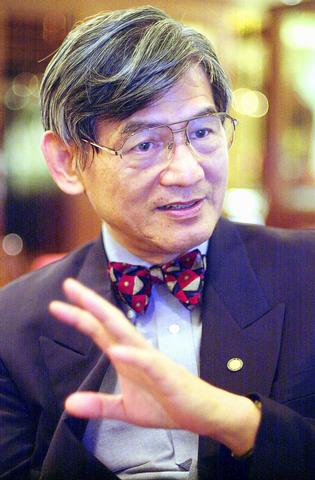
PHOTO: CHEN CHENG-CHANG, TAIPEI TIMES
Since returning to Taiwan, Wu's work has continued undaunted. He has actively lobbied for Taiwan's UN entry and admission to the World Health Organization.
"The name `Taiwan' has to be recognized. But before the title can be acknowledged internationally, Taiwanese have to first reach a consensus that this is the only solution," Wu said.
But Wu said that many Taiwanese are apathetic. "Compared with Taiwanese abroad, people in the country seem to be much more nonchalant about Taiwan's international standing and the continuation of Taiwan's cultural heritage."
"The reason why Taiwan encounters so many obstacles on the international front lies not in intimidation from China or from a lack of international support. The heart of the problem resides in the Taiwanese themselves.
"Many Taiwanese, especially the younger generation, face serious identity crises. They lead their lives without developing any substantial cultural roots."
Wu said that Taiwan's lack of cultural recognition can be attributed to 50 years under KMT rule, which, he said, steeped the nation in Chinese ideology. The KMT's control over education and the media only further hampered the development of Taiwanese culture, he said.
With an aim to mend the mistakes of the KMT, the Northern Taiwan Society was formed in order "to elevate Taiwanese culture and fortify the Taiwanese spirit.
"Only by building people's confidence and self-esteem can Taiwan generate enough strength to stand up and walk into the international community," he said.
`A pathological perspective'
Although sharing similar political ideologies, the Southern Taiwan Society, when compared with the other three organizations, appears to be bolder in making its political views known.
People attribute the progress of the Southern Taiwan Society to its leader -- Dr. Tzeng Kuei-hai (
"I have a strong belief in taking action," said Tzeng, who has been involved in social movements, especially those regarding environmental issues, for 13 years.
"It is undeniable that knowledge is an impetus to progress. But knowledge can't make any difference in society without action."
Earlier this year, Tzeng condemned the KMT when the party expelled its former chairman Lee Teng-hui (
Dubbed "the green godfather of the south," Tzeng said that for him, being human means speaking up for himself and championing a better society.
Founded in July of last year, the Southern Taiwan society was the first of the four societies to be established.
Tzeng said that he had anticipated the pains that would accompany the nation's first transfer of political power in May last year.
"Democracy in Taiwan was premature. The subsequent development proved what I felt would be true: When the KMT lost its grip on power, it turned them into an irrational opposition force, making them a major source of social instability," Tzeng said.
"The newly formed government stood on such shaky ground that backing from different regions was badly needed."
Since it was formed, the Southern Taiwan Society has expressed support for the government, worked on the promotion of Taiwan's culture and has pondered contentious issues regarding Taiwan's national identity from a pro-Taiwan perspective.
Tzeng refuted criticism that the group is guided by extreme nationalist ideology.
"I detest any form of nationalism, I just think from the perspective of being a human being. All I have done stems from the idea that I love this country and I care about all the people here, irrespective of their ethnic background."
Tzeng's concern for his country and people date back to his undergraduate years.
While he was a student at Kaohsiung Medical College, Tzeng began to write poetry.
In his first attempt at verse, entitled Kaohsiung -- he wrote of his grief for the way the pristine city was being ravaged by pollution because of its rapid industrialization.
Later on as a doctor, Tzeng continued to express his affection for the land in his work with various environmental protection campaigns, becoming a leader in the area's environmental movement.
When asked about how he is able to balance his work as a physician, poet and social activist, Tzeng said that "the three are seemingly different, but in reality they share much in common and can be interwoven perfectly.
"A doctor's duty is to diagnose symptoms and try to effectively cure diseases. Following the same principle, if we analyze Taiwan's environment from a pathological perspective, it is like a patient suffering from a chronic disease," he said.
"The environmental activist's duty is to combat the devastating origin [of the disease].
"Then if I translate the analytical process and my own sentiments into words, the poetry comes in. It is all related to a humanitarian concern for people and for the land," Tzeng said.
Keeping `wicked politicians' in checkFor more than two decades, obstetrician and gynecologist Chung Kun-ching (鐘坤井) devoted himself to the fight against the authoritarian KMT-regime. Like most democracy activists, he was pleased to see the first transfer of power last year.
But Chung's happiness did not last very long.
"Although the DPP is in power, it has been a very rocky administration because of deliberate obstruction by the opposition," Chung said.
Chung's frustration reached its limit last November when the newly formed government was challenged by its first crisis after the opposition teamed up in a bid to oust President Chen Shui-bian (陳水扁) over his government's decision to halt the construction of the Fourth Nuclear Power Plant (核四).
In order to help the DPP through the crisis, the idea for establishing the Central Taiwan Society was born.
And Chung -- a veteran campaigner for the democracy movement in central Taiwan, and the standing director of the Foundation of the Medical Professionals Alliance in Taiwan -- was a natural candidate for the association's leader.
"Chung has received great respect for his strides for a democratic Taiwan and his longtime endeavor to advocate Taiwan's accession to the WHO. In the quest for social justice, Dr. Chung has spared no effort," said Ian Liao (廖宜恩), a member of the association and a mathematician at National Chungshing University.
In the political landscape of the time, Chung stressed that non-governmental organizations had to exert their influence because it was his belief that the shaky position of the central government could not be fortified without grassroots support.
Once the organization was founded, Chung was quick to launch initiatives to demonstrate the group's support for the Chen administration.
While all four organizations share similar political views, the central Taiwan society stands out from the other three because of its promotion of cultural and educational reforms that aim to make the notion of "Taiwan first" the foundation of the country's educational system.
To achieve this end, the organization has exerted tremendous effort toward elevating the position of Taiwanese art and literature, because it believes "cultural recognition -- a vital part of the nation's democratization process -- should be prioritized so as to allow for the development of national recognition."
Due in part to the group's efforts, the Ministry of Education has approved the establishment of graduate departments for Taiwanese literature at the nation's universities and has promised to establish graduate departments for Taiwanese history as well.
At the primary and secondary school levels, the association hopes to persuade the relevant government departments to change the current curriculum from its China-centric focus to one that emphasizes Taiwan.
"We love Taiwan, so we are willing to lend the government our support, both intellectually and financially," Chung said.
"What we have done is merely the continuation of three decades of [pro-democracy] work. We need to work harder, because we can't sit and wait for hard-sought democratic results to be destroyed by a few wicked politicians."
`A chance at redemption'
Peter Huang (
But when the Eastern Taiwan Society was searching for a chairman when it was established last month, Huang was unanimously deemed the society's first choice.
"They picked me as a leader because of my helpful personality and my deep concern about issues related to the public interest," Huang said.
"As a doctor, I have cultivated skills for analyzing problems and for treating diseases accurately in the process of communicating with patients.
"The same theory can be applied to politics, because it is a means of promulgating ideas that are beneficial to the public."
Eight years ago, Huang decided to leave a life in the US to assume the presidency of Hualien's Mennonite Christian Hospital, despite not being a Hualien native.
Huang made the move with the aim of serving the country's poorest region and protect what was a clean area of land.
"There is something admirable about people in Hualien. Located in the backwater of the country, Hualien citizens do their work silently.
"They don't even complain when being mistreated," Huang said. "Despite it being an arduous task, I am very happy and content to be able to serve this poverty-stricken city."
Citing German doctor Albert Schweitzer -- who won a Nobel Peace Prize for his humanitarian work as a missionary doctor in Africa, among other endeavors -- as his role model, the brain surgeon said he hopes one day he can give his help to areas that are poor and isolated.
Treating at least 500 patients a year and being a medical advisor to former US president Ronald Reagan, Huang was dubbed "the doctor's doctor" in the US.
But in 1993, he accepted retiring missionary Ronald Brown's offer to head the hospital.
"It was the call of my religious faith," the devout Christian said, responding to people's surprise that he left the US after spending 25 years there.
"When I was younger, I was not able to fulfill my obligation to serve my country. The choice to return home was sort of a chance at redemption -- I meant to make up for what I should have done in the old days."
Deeply influenced by Christian teachings to love and care for people, Huang said that in the past, Taiwan had received tremendous help from Western missionaries, especially in the area of medicine.
"Now it is the time for us Taiwanese to help ourselves. It is time for me to do something in return to express my gratitude for what I have received."
Huang said the society's goals are to build a clean Hualien and emphasize environmental awareness and politics free of corruption through education.
"Hualien is the last piece of clean land in Taiwan in terms of the environment and in the character of its people.
"How to preserve that environmental pureness and prevent people from being tainted by deteriorating political ethics are my major concerns," Huang said.
In addition to practicing medicine, Huang has been involved in several environmental protection initiatives over the years, including organizing against the construction of incinerators and cement factories.
On the eve of the December legislative elections, Huang said he will launch a campaign against vote-buying.
"At this stage, while democracy is still young in our country, we consider it the association's duty to educate the public and make a positive impact on society," Huang said.

Intelligence agents have recorded 510,000 instances of “controversial information” being spread online by the Chinese Communist Party (CCP) so far this year, the National Security Bureau (NSB) said in a report yesterday, as it warned of artificial intelligence (AI) being employed to generate destabilizing misinformation. The bureau submitted a written report to the Legislative Yuan in preparation for National Security Bureau Director-General Tsai Ming-yen’s (蔡明彥) appearance before the Foreign Affairs and National Defense Committee today. The CCP has been using cognitive warfare to divide Taiwanese society by commenting on controversial issues such as Taiwan Semiconductor Manufacturing Co’s (TSMC, 台積電) investments in the

HELPING HAND: The steering committee of the National Stabilization Fund is expected to hold a meeting to discuss how and when to utilize the fund to help buffer the sell-off The TAIEX plunged 2,065.87 points, or 9.7 percent, to close at 19,232.35 yesterday, the highest single-day percentage loss on record, as investors braced for US President Donald Trump’s tariffs after an extended holiday weekend. Amid the pessimistic atmosphere, 945 listed companies led by large-cap stocks — including Taiwan Semiconductor Manufacturing Co (TSMC, 台積電), Hon Hai Precision Industry Co (鴻海精密) and Largan Precision Co (大立光) — fell by the daily maximum of 10 percent at the close, Taiwan Stock Exchange data showed. The number of listed companies ending limit-down set a new record, the exchange said. The TAIEX plunged by daily maxiumu in just

‘COMPREHENSIVE PLAN’: Lin Chia-lung said that the government was ready to talk about a variety of issues, including investment in and purchases from the US The National Stabilization Fund (NSF) yesterday announced that it would step in to staunch stock market losses for the ninth time in the nation’s history. An NSF board meeting, originally scheduled for Monday next week, was moved to yesterday after stocks plummeted in the wake of US President Donald Trump’s announcement of 32 percent tariffs on Taiwan on Wednesday last week. Board members voted to support the stock market with the NT$500 billion (US$15.15 billion) fund, with injections of funds to begin as soon as today. The NSF in 2000 injected NT$120 billion to stabilize stocks, the most ever. The lowest amount it

NEGOTIATIONS: Taiwan has good relations with Washington and the outlook for the negotiations looks promising, Minister of Economic Affairs J.W. Kuo said Taiwan’s GDP growth this year is expected to decrease by 0.43 to 1.61 percentage points due to the effects of US tariffs, National Development Council (NDC) Minister Paul Liu (劉鏡清) said at a meeting of the legislature’s Economics Committee in Taipei yesterday, citing a preliminary estimate by a private research institution. Taiwan’s economy would be significantly affected by the 32 percent “reciprocal” tariffs slapped by the US, which took effect yesterday, Liu said, adding that GDP growth could fall below 3 percent and potentially even dip below 2 percent to 1.53 percent this year. The council has commissioned another institution